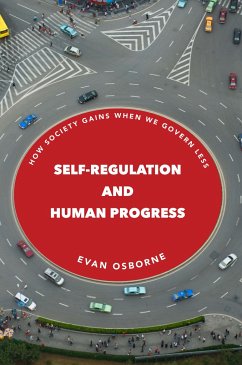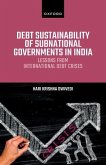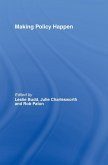- Gebundenes Buch
- Merkliste
- Auf die Merkliste
- Bewerten Bewerten
- Teilen
- Produkt teilen
- Produkterinnerung
- Produkterinnerung
Evan Osborne is Professor of Economics at Wright State University. He is the author of Reasonably Simple Economics: Why the World Works the Way it Does (2013) and The Rise of the Anti-Corporate Movement: Corporations and the People Who Hate Them (2007).
Andere Kunden interessierten sich auch für
![Human Evolution, Economic Progress and Evolutionary Failure Human Evolution, Economic Progress and Evolutionary Failure]() Bhanoji RaoHuman Evolution, Economic Progress and Evolutionary Failure202,99 €
Bhanoji RaoHuman Evolution, Economic Progress and Evolutionary Failure202,99 €![Debt Sustainability of Subnational Governments in India Debt Sustainability of Subnational Governments in India]() Hari Krishna DwivediDebt Sustainability of Subnational Governments in India137,99 €
Hari Krishna DwivediDebt Sustainability of Subnational Governments in India137,99 €![The Gospel of Greed: Spirit of Commercialism the Vital Controlling Force in Human Affairs; Results in Progress for Humanity, Individualism The Gospel of Greed: Spirit of Commercialism the Vital Controlling Force in Human Affairs; Results in Progress for Humanity, Individualism]() Charles Hubert McDermottThe Gospel of Greed: Spirit of Commercialism the Vital Controlling Force in Human Affairs; Results in Progress for Humanity, Individualism37,99 €
Charles Hubert McDermottThe Gospel of Greed: Spirit of Commercialism the Vital Controlling Force in Human Affairs; Results in Progress for Humanity, Individualism37,99 €![Human Evolution, Economic Progress and Evolutionary Failure Human Evolution, Economic Progress and Evolutionary Failure]() Bhanoji RaoHuman Evolution, Economic Progress and Evolutionary Failure63,99 €
Bhanoji RaoHuman Evolution, Economic Progress and Evolutionary Failure63,99 €![Debow's Review: Agricultural, Commercial, Industrial Progress and Resources; Volume 11 Debow's Review: Agricultural, Commercial, Industrial Progress and Resources; Volume 11]() James Dunwoody Brownson De BowDebow's Review: Agricultural, Commercial, Industrial Progress and Resources; Volume 1150,99 €
James Dunwoody Brownson De BowDebow's Review: Agricultural, Commercial, Industrial Progress and Resources; Volume 1150,99 €![Making Policy Happen Making Policy Happen]() Leslie Budd / Julie Charlesworth / Rob Paton (eds.)Making Policy Happen264,99 €
Leslie Budd / Julie Charlesworth / Rob Paton (eds.)Making Policy Happen264,99 €![Organizational Behavior Organizational Behavior]() Meshack Mairura SaginiOrganizational Behavior220,99 €
Meshack Mairura SaginiOrganizational Behavior220,99 €-
-
Evan Osborne is Professor of Economics at Wright State University. He is the author of Reasonably Simple Economics: Why the World Works the Way it Does (2013) and The Rise of the Anti-Corporate Movement: Corporations and the People Who Hate Them (2007).
Hinweis: Dieser Artikel kann nur an eine deutsche Lieferadresse ausgeliefert werden.
Hinweis: Dieser Artikel kann nur an eine deutsche Lieferadresse ausgeliefert werden.
Produktdetails
- Produktdetails
- Verlag: Stanford University Press
- Seitenzahl: 272
- Erscheinungstermin: 23. Januar 2018
- Englisch
- Abmessung: 231mm x 155mm x 23mm
- Gewicht: 612g
- ISBN-13: 9780804796446
- ISBN-10: 0804796440
- Artikelnr.: 47772015
- Herstellerkennzeichnung
- Libri GmbH
- Europaallee 1
- 36244 Bad Hersfeld
- gpsr@libri.de
- Verlag: Stanford University Press
- Seitenzahl: 272
- Erscheinungstermin: 23. Januar 2018
- Englisch
- Abmessung: 231mm x 155mm x 23mm
- Gewicht: 612g
- ISBN-13: 9780804796446
- ISBN-10: 0804796440
- Artikelnr.: 47772015
- Herstellerkennzeichnung
- Libri GmbH
- Europaallee 1
- 36244 Bad Hersfeld
- gpsr@libri.de
Evan Osborne is Professor of Economics at Wright State University. He is the author of Reasonably Simple Economics: Why the World Works the Way it Does (2013) and The Rise of the Anti-Corporate Movement: Corporations and the People Who Hate Them (2007).
Contents and Abstracts
1Problems and Responses
chapter abstract
Social systems can always function better than they do at a particular
moment. Whether there is a need to return to normal after an unexpected
disruption or to try to permanently improve the system's performance, there
is a never-ending set of problems to address. This book describes the
contrast between addressing such problems from outside that system through
politics and allowing the participants in that system to self-regulate
without external guidance of this kind. This chapter introduces this
problem and these two contrasting approaches to it, and defines some terms
that are frequently used in the book.
2Getting There: The Long Road to Self-Regulation
chapter abstract
Almost as long there has been a human species, we have formed societies
based on the principle of political regulation. There is a small cadre of
leaders often assumed to have the right to order the lives of other members
of society, supported by a current monopoly of armaments. While not
universal, this pattern has been the norm since the agricultural
revolution. In particular, it is argued that the idea of continuous social
improvement was hardly known in ancient civilizations. Only in the late
Renaissance did a pattern of thought evolve that indicated that it is
better to see the pattern and outcomes of human social systems as
progressing, with such systems capable under certain circumstances of
regulating themselves to better effect than outsiders could hope to
regulate them.
3Wrongs Make Rights: Self-Regulating Science
chapter abstract
Beginning in the 1600s, primarily in Britain, the Dutch Territories, and
France, people not only tried to think about how the world worked (a
pattern of thought as old as human civilization); they also agreed that
there was much that was yet unknown and collectively built procedures for
how to know more. The construction of the system for defining such
knowledge and evaluating claims to be adding to it has been a gradual
evolution that continues to this day. Among the landmark events discussed
are the development of the ideas of hypotheses, the experimental method,
free competition among scientific ideas, the use of the (growing number of)
mathematical tools to arbitrate scientific claims, the development of
modern research universities, the establishment and improvement of the peer
review system, and the more recent addition of techniques beyond
traditional scientific experiments as ways of supporting or falsifying
scientific claims.
4The Less Unsaid the Better: Self-Regulating Free Speech
chapter abstract
The question of how much free expression to tolerate hardly came up until
the modern era. The creation in Europe of the printing press changed that
and made expression a threat to long-standing social institutions. The
nature of the new technology made it impossible to fully control the flow
of books, pamphlets, and other printed material, but European governments
tried. The argument in favor of a free press ultimately emerged, and the
practice itself was institutionalized, mostly in Great Britain and
northwestern Europe. The chapter emphasizes the self-regulating argument
for free communication, that ideas beyond science would be improved if they
must be subject to readers' scrutiny. Particular attention is paid to
Milton, Struensee and John Stuart Mill. The arguments made in favor of the
broad protection of freedom of speech that prevail in much of the world are
shown to have significant self-regulating components.
5A Better Way Forward: Self-Regulating Socioeconomics
chapter abstract
There is a long history of condemning merchants as agents of social
disorder and little advocacy of free commerce as essential to ensure the
proper allocation of efforts across economic activities and promote
socioeconomic improvements. This began to change with both Aquinas and
thinkers in the late Renaissance in Spain asking different questions about
how producers could be induced to provide goods in a way that benefits
society. The contributions of Bernard Mandeville, Anne Robert Jacques
Turgot and, Adam Smith are sketched. By the end of the nineteenth century,
much of the general public and even political leaders in Europe and North
America believed in the virtues of the self-regulating socioeconomy.
Through colonialism and observation of the "modern" West's seemingly
obvious successes, people and societies around the world began in
ever-larger numbers to believe as well. But such widespread confidence was
not to last.
6Realignment: Fine Tuning in Light of Self-Regulation's Deficiencies
chapter abstract
The later nineteenth and early twentieth centuries witnessed arguments from
social reformers and artists and economists that the new, spontaneously
evolving society was deficient. It worsened poverty, and it impoverished
the soul. The tool of political regulation, exercised in the growing
political power of the emerging organization known as the nation, was
called in to polish the rough edges of the self-regulating society. As time
went on, political regulation gradually came to be seen as the default, and
self-regulation needed to be justified. The chapter particularly emphasizes
the growth in such thinking among socialists and progressives in the United
States and Western Europe. The catastrophe of the Great Depression,
combined with admiration for a Soviet Union, Italy, and Germany, where
political regulators said they were rationally designing a better society,
meant that by the onset of World War II, this presumption was firmly in
place throughout the West.
7Rebuilding: Systemic Changes to Counter Self-Regulation's Flaws
chapter abstract
Here the analysis turns to questioning the very premises that underlie the
virtues of self-regulating social systems. Macro-objections agree that
individuals cannot be assumed to be able to do what is best. It is the job
of political regulators to take over and facilitate the development of
society. Marxist theory in particular viewed history as unfolding
inevitably, and so appalling cruelties were inflicted by Marxist
governments to steer the revolution forward. The eugenics revolution
categorized entire groups of people as genetically inferior, frequently
because of their ethnicity. Politics was used in various countries to
improve society by reducing births among inferior types. Micro-objections
to self-regulation described individuals as incapable of being incented to
choose what self-regulation requires. In either case, it is the essential
task of political regulators to replace, if not destroy, the outcomes of
the choices made under self-regulation.
8Assessing the Decline of Confidence in Self-Regulation
chapter abstract
This chapter uses the new Google nGrams database to track the rise and fall
of different English-language phrases in order to illustrate the
corresponding rise and fall in confidence in self-regulation. After briefly
introducing evidence on the rise in the extent of political regulation over
the last century or so, documentation is presented on the parallel rise in
skepticism of the self-regulating socioeconomy and self-regulating science
generally, and in skepticism of the cognitive capacity of individuals to
make socially productive choices in particular.
9The Best Way(s) Forward
chapter abstract
There is good reason to be skeptical of the assumption that political
regulation operates with the public interest in mind. Scientific
productivity has continued to advance in the past half-century, as has the
value and quantity of human expression. The argument in favor of
socioeconomic self-regulation is identical to that for the other two
systems. Yet recent scholarship suggests declining rates of economic growth
in the wealthiest countries most subject to increasing political regulation
during this period, while greater reliance on self-regulating economic
forces has resulted in dramatic improvement of socioeconomies in the
developing world. As political regulation of human expression has declined,
literary, artistic, and philosophical achievement have expanded. Guidance
is offered for how people should understand social change in their role as
citizens and how they should conduct themselves in a world full of
short-term instability but tremendous long-term progress.
1Problems and Responses
chapter abstract
Social systems can always function better than they do at a particular
moment. Whether there is a need to return to normal after an unexpected
disruption or to try to permanently improve the system's performance, there
is a never-ending set of problems to address. This book describes the
contrast between addressing such problems from outside that system through
politics and allowing the participants in that system to self-regulate
without external guidance of this kind. This chapter introduces this
problem and these two contrasting approaches to it, and defines some terms
that are frequently used in the book.
2Getting There: The Long Road to Self-Regulation
chapter abstract
Almost as long there has been a human species, we have formed societies
based on the principle of political regulation. There is a small cadre of
leaders often assumed to have the right to order the lives of other members
of society, supported by a current monopoly of armaments. While not
universal, this pattern has been the norm since the agricultural
revolution. In particular, it is argued that the idea of continuous social
improvement was hardly known in ancient civilizations. Only in the late
Renaissance did a pattern of thought evolve that indicated that it is
better to see the pattern and outcomes of human social systems as
progressing, with such systems capable under certain circumstances of
regulating themselves to better effect than outsiders could hope to
regulate them.
3Wrongs Make Rights: Self-Regulating Science
chapter abstract
Beginning in the 1600s, primarily in Britain, the Dutch Territories, and
France, people not only tried to think about how the world worked (a
pattern of thought as old as human civilization); they also agreed that
there was much that was yet unknown and collectively built procedures for
how to know more. The construction of the system for defining such
knowledge and evaluating claims to be adding to it has been a gradual
evolution that continues to this day. Among the landmark events discussed
are the development of the ideas of hypotheses, the experimental method,
free competition among scientific ideas, the use of the (growing number of)
mathematical tools to arbitrate scientific claims, the development of
modern research universities, the establishment and improvement of the peer
review system, and the more recent addition of techniques beyond
traditional scientific experiments as ways of supporting or falsifying
scientific claims.
4The Less Unsaid the Better: Self-Regulating Free Speech
chapter abstract
The question of how much free expression to tolerate hardly came up until
the modern era. The creation in Europe of the printing press changed that
and made expression a threat to long-standing social institutions. The
nature of the new technology made it impossible to fully control the flow
of books, pamphlets, and other printed material, but European governments
tried. The argument in favor of a free press ultimately emerged, and the
practice itself was institutionalized, mostly in Great Britain and
northwestern Europe. The chapter emphasizes the self-regulating argument
for free communication, that ideas beyond science would be improved if they
must be subject to readers' scrutiny. Particular attention is paid to
Milton, Struensee and John Stuart Mill. The arguments made in favor of the
broad protection of freedom of speech that prevail in much of the world are
shown to have significant self-regulating components.
5A Better Way Forward: Self-Regulating Socioeconomics
chapter abstract
There is a long history of condemning merchants as agents of social
disorder and little advocacy of free commerce as essential to ensure the
proper allocation of efforts across economic activities and promote
socioeconomic improvements. This began to change with both Aquinas and
thinkers in the late Renaissance in Spain asking different questions about
how producers could be induced to provide goods in a way that benefits
society. The contributions of Bernard Mandeville, Anne Robert Jacques
Turgot and, Adam Smith are sketched. By the end of the nineteenth century,
much of the general public and even political leaders in Europe and North
America believed in the virtues of the self-regulating socioeconomy.
Through colonialism and observation of the "modern" West's seemingly
obvious successes, people and societies around the world began in
ever-larger numbers to believe as well. But such widespread confidence was
not to last.
6Realignment: Fine Tuning in Light of Self-Regulation's Deficiencies
chapter abstract
The later nineteenth and early twentieth centuries witnessed arguments from
social reformers and artists and economists that the new, spontaneously
evolving society was deficient. It worsened poverty, and it impoverished
the soul. The tool of political regulation, exercised in the growing
political power of the emerging organization known as the nation, was
called in to polish the rough edges of the self-regulating society. As time
went on, political regulation gradually came to be seen as the default, and
self-regulation needed to be justified. The chapter particularly emphasizes
the growth in such thinking among socialists and progressives in the United
States and Western Europe. The catastrophe of the Great Depression,
combined with admiration for a Soviet Union, Italy, and Germany, where
political regulators said they were rationally designing a better society,
meant that by the onset of World War II, this presumption was firmly in
place throughout the West.
7Rebuilding: Systemic Changes to Counter Self-Regulation's Flaws
chapter abstract
Here the analysis turns to questioning the very premises that underlie the
virtues of self-regulating social systems. Macro-objections agree that
individuals cannot be assumed to be able to do what is best. It is the job
of political regulators to take over and facilitate the development of
society. Marxist theory in particular viewed history as unfolding
inevitably, and so appalling cruelties were inflicted by Marxist
governments to steer the revolution forward. The eugenics revolution
categorized entire groups of people as genetically inferior, frequently
because of their ethnicity. Politics was used in various countries to
improve society by reducing births among inferior types. Micro-objections
to self-regulation described individuals as incapable of being incented to
choose what self-regulation requires. In either case, it is the essential
task of political regulators to replace, if not destroy, the outcomes of
the choices made under self-regulation.
8Assessing the Decline of Confidence in Self-Regulation
chapter abstract
This chapter uses the new Google nGrams database to track the rise and fall
of different English-language phrases in order to illustrate the
corresponding rise and fall in confidence in self-regulation. After briefly
introducing evidence on the rise in the extent of political regulation over
the last century or so, documentation is presented on the parallel rise in
skepticism of the self-regulating socioeconomy and self-regulating science
generally, and in skepticism of the cognitive capacity of individuals to
make socially productive choices in particular.
9The Best Way(s) Forward
chapter abstract
There is good reason to be skeptical of the assumption that political
regulation operates with the public interest in mind. Scientific
productivity has continued to advance in the past half-century, as has the
value and quantity of human expression. The argument in favor of
socioeconomic self-regulation is identical to that for the other two
systems. Yet recent scholarship suggests declining rates of economic growth
in the wealthiest countries most subject to increasing political regulation
during this period, while greater reliance on self-regulating economic
forces has resulted in dramatic improvement of socioeconomies in the
developing world. As political regulation of human expression has declined,
literary, artistic, and philosophical achievement have expanded. Guidance
is offered for how people should understand social change in their role as
citizens and how they should conduct themselves in a world full of
short-term instability but tremendous long-term progress.
Contents and Abstracts
1Problems and Responses
chapter abstract
Social systems can always function better than they do at a particular
moment. Whether there is a need to return to normal after an unexpected
disruption or to try to permanently improve the system's performance, there
is a never-ending set of problems to address. This book describes the
contrast between addressing such problems from outside that system through
politics and allowing the participants in that system to self-regulate
without external guidance of this kind. This chapter introduces this
problem and these two contrasting approaches to it, and defines some terms
that are frequently used in the book.
2Getting There: The Long Road to Self-Regulation
chapter abstract
Almost as long there has been a human species, we have formed societies
based on the principle of political regulation. There is a small cadre of
leaders often assumed to have the right to order the lives of other members
of society, supported by a current monopoly of armaments. While not
universal, this pattern has been the norm since the agricultural
revolution. In particular, it is argued that the idea of continuous social
improvement was hardly known in ancient civilizations. Only in the late
Renaissance did a pattern of thought evolve that indicated that it is
better to see the pattern and outcomes of human social systems as
progressing, with such systems capable under certain circumstances of
regulating themselves to better effect than outsiders could hope to
regulate them.
3Wrongs Make Rights: Self-Regulating Science
chapter abstract
Beginning in the 1600s, primarily in Britain, the Dutch Territories, and
France, people not only tried to think about how the world worked (a
pattern of thought as old as human civilization); they also agreed that
there was much that was yet unknown and collectively built procedures for
how to know more. The construction of the system for defining such
knowledge and evaluating claims to be adding to it has been a gradual
evolution that continues to this day. Among the landmark events discussed
are the development of the ideas of hypotheses, the experimental method,
free competition among scientific ideas, the use of the (growing number of)
mathematical tools to arbitrate scientific claims, the development of
modern research universities, the establishment and improvement of the peer
review system, and the more recent addition of techniques beyond
traditional scientific experiments as ways of supporting or falsifying
scientific claims.
4The Less Unsaid the Better: Self-Regulating Free Speech
chapter abstract
The question of how much free expression to tolerate hardly came up until
the modern era. The creation in Europe of the printing press changed that
and made expression a threat to long-standing social institutions. The
nature of the new technology made it impossible to fully control the flow
of books, pamphlets, and other printed material, but European governments
tried. The argument in favor of a free press ultimately emerged, and the
practice itself was institutionalized, mostly in Great Britain and
northwestern Europe. The chapter emphasizes the self-regulating argument
for free communication, that ideas beyond science would be improved if they
must be subject to readers' scrutiny. Particular attention is paid to
Milton, Struensee and John Stuart Mill. The arguments made in favor of the
broad protection of freedom of speech that prevail in much of the world are
shown to have significant self-regulating components.
5A Better Way Forward: Self-Regulating Socioeconomics
chapter abstract
There is a long history of condemning merchants as agents of social
disorder and little advocacy of free commerce as essential to ensure the
proper allocation of efforts across economic activities and promote
socioeconomic improvements. This began to change with both Aquinas and
thinkers in the late Renaissance in Spain asking different questions about
how producers could be induced to provide goods in a way that benefits
society. The contributions of Bernard Mandeville, Anne Robert Jacques
Turgot and, Adam Smith are sketched. By the end of the nineteenth century,
much of the general public and even political leaders in Europe and North
America believed in the virtues of the self-regulating socioeconomy.
Through colonialism and observation of the "modern" West's seemingly
obvious successes, people and societies around the world began in
ever-larger numbers to believe as well. But such widespread confidence was
not to last.
6Realignment: Fine Tuning in Light of Self-Regulation's Deficiencies
chapter abstract
The later nineteenth and early twentieth centuries witnessed arguments from
social reformers and artists and economists that the new, spontaneously
evolving society was deficient. It worsened poverty, and it impoverished
the soul. The tool of political regulation, exercised in the growing
political power of the emerging organization known as the nation, was
called in to polish the rough edges of the self-regulating society. As time
went on, political regulation gradually came to be seen as the default, and
self-regulation needed to be justified. The chapter particularly emphasizes
the growth in such thinking among socialists and progressives in the United
States and Western Europe. The catastrophe of the Great Depression,
combined with admiration for a Soviet Union, Italy, and Germany, where
political regulators said they were rationally designing a better society,
meant that by the onset of World War II, this presumption was firmly in
place throughout the West.
7Rebuilding: Systemic Changes to Counter Self-Regulation's Flaws
chapter abstract
Here the analysis turns to questioning the very premises that underlie the
virtues of self-regulating social systems. Macro-objections agree that
individuals cannot be assumed to be able to do what is best. It is the job
of political regulators to take over and facilitate the development of
society. Marxist theory in particular viewed history as unfolding
inevitably, and so appalling cruelties were inflicted by Marxist
governments to steer the revolution forward. The eugenics revolution
categorized entire groups of people as genetically inferior, frequently
because of their ethnicity. Politics was used in various countries to
improve society by reducing births among inferior types. Micro-objections
to self-regulation described individuals as incapable of being incented to
choose what self-regulation requires. In either case, it is the essential
task of political regulators to replace, if not destroy, the outcomes of
the choices made under self-regulation.
8Assessing the Decline of Confidence in Self-Regulation
chapter abstract
This chapter uses the new Google nGrams database to track the rise and fall
of different English-language phrases in order to illustrate the
corresponding rise and fall in confidence in self-regulation. After briefly
introducing evidence on the rise in the extent of political regulation over
the last century or so, documentation is presented on the parallel rise in
skepticism of the self-regulating socioeconomy and self-regulating science
generally, and in skepticism of the cognitive capacity of individuals to
make socially productive choices in particular.
9The Best Way(s) Forward
chapter abstract
There is good reason to be skeptical of the assumption that political
regulation operates with the public interest in mind. Scientific
productivity has continued to advance in the past half-century, as has the
value and quantity of human expression. The argument in favor of
socioeconomic self-regulation is identical to that for the other two
systems. Yet recent scholarship suggests declining rates of economic growth
in the wealthiest countries most subject to increasing political regulation
during this period, while greater reliance on self-regulating economic
forces has resulted in dramatic improvement of socioeconomies in the
developing world. As political regulation of human expression has declined,
literary, artistic, and philosophical achievement have expanded. Guidance
is offered for how people should understand social change in their role as
citizens and how they should conduct themselves in a world full of
short-term instability but tremendous long-term progress.
1Problems and Responses
chapter abstract
Social systems can always function better than they do at a particular
moment. Whether there is a need to return to normal after an unexpected
disruption or to try to permanently improve the system's performance, there
is a never-ending set of problems to address. This book describes the
contrast between addressing such problems from outside that system through
politics and allowing the participants in that system to self-regulate
without external guidance of this kind. This chapter introduces this
problem and these two contrasting approaches to it, and defines some terms
that are frequently used in the book.
2Getting There: The Long Road to Self-Regulation
chapter abstract
Almost as long there has been a human species, we have formed societies
based on the principle of political regulation. There is a small cadre of
leaders often assumed to have the right to order the lives of other members
of society, supported by a current monopoly of armaments. While not
universal, this pattern has been the norm since the agricultural
revolution. In particular, it is argued that the idea of continuous social
improvement was hardly known in ancient civilizations. Only in the late
Renaissance did a pattern of thought evolve that indicated that it is
better to see the pattern and outcomes of human social systems as
progressing, with such systems capable under certain circumstances of
regulating themselves to better effect than outsiders could hope to
regulate them.
3Wrongs Make Rights: Self-Regulating Science
chapter abstract
Beginning in the 1600s, primarily in Britain, the Dutch Territories, and
France, people not only tried to think about how the world worked (a
pattern of thought as old as human civilization); they also agreed that
there was much that was yet unknown and collectively built procedures for
how to know more. The construction of the system for defining such
knowledge and evaluating claims to be adding to it has been a gradual
evolution that continues to this day. Among the landmark events discussed
are the development of the ideas of hypotheses, the experimental method,
free competition among scientific ideas, the use of the (growing number of)
mathematical tools to arbitrate scientific claims, the development of
modern research universities, the establishment and improvement of the peer
review system, and the more recent addition of techniques beyond
traditional scientific experiments as ways of supporting or falsifying
scientific claims.
4The Less Unsaid the Better: Self-Regulating Free Speech
chapter abstract
The question of how much free expression to tolerate hardly came up until
the modern era. The creation in Europe of the printing press changed that
and made expression a threat to long-standing social institutions. The
nature of the new technology made it impossible to fully control the flow
of books, pamphlets, and other printed material, but European governments
tried. The argument in favor of a free press ultimately emerged, and the
practice itself was institutionalized, mostly in Great Britain and
northwestern Europe. The chapter emphasizes the self-regulating argument
for free communication, that ideas beyond science would be improved if they
must be subject to readers' scrutiny. Particular attention is paid to
Milton, Struensee and John Stuart Mill. The arguments made in favor of the
broad protection of freedom of speech that prevail in much of the world are
shown to have significant self-regulating components.
5A Better Way Forward: Self-Regulating Socioeconomics
chapter abstract
There is a long history of condemning merchants as agents of social
disorder and little advocacy of free commerce as essential to ensure the
proper allocation of efforts across economic activities and promote
socioeconomic improvements. This began to change with both Aquinas and
thinkers in the late Renaissance in Spain asking different questions about
how producers could be induced to provide goods in a way that benefits
society. The contributions of Bernard Mandeville, Anne Robert Jacques
Turgot and, Adam Smith are sketched. By the end of the nineteenth century,
much of the general public and even political leaders in Europe and North
America believed in the virtues of the self-regulating socioeconomy.
Through colonialism and observation of the "modern" West's seemingly
obvious successes, people and societies around the world began in
ever-larger numbers to believe as well. But such widespread confidence was
not to last.
6Realignment: Fine Tuning in Light of Self-Regulation's Deficiencies
chapter abstract
The later nineteenth and early twentieth centuries witnessed arguments from
social reformers and artists and economists that the new, spontaneously
evolving society was deficient. It worsened poverty, and it impoverished
the soul. The tool of political regulation, exercised in the growing
political power of the emerging organization known as the nation, was
called in to polish the rough edges of the self-regulating society. As time
went on, political regulation gradually came to be seen as the default, and
self-regulation needed to be justified. The chapter particularly emphasizes
the growth in such thinking among socialists and progressives in the United
States and Western Europe. The catastrophe of the Great Depression,
combined with admiration for a Soviet Union, Italy, and Germany, where
political regulators said they were rationally designing a better society,
meant that by the onset of World War II, this presumption was firmly in
place throughout the West.
7Rebuilding: Systemic Changes to Counter Self-Regulation's Flaws
chapter abstract
Here the analysis turns to questioning the very premises that underlie the
virtues of self-regulating social systems. Macro-objections agree that
individuals cannot be assumed to be able to do what is best. It is the job
of political regulators to take over and facilitate the development of
society. Marxist theory in particular viewed history as unfolding
inevitably, and so appalling cruelties were inflicted by Marxist
governments to steer the revolution forward. The eugenics revolution
categorized entire groups of people as genetically inferior, frequently
because of their ethnicity. Politics was used in various countries to
improve society by reducing births among inferior types. Micro-objections
to self-regulation described individuals as incapable of being incented to
choose what self-regulation requires. In either case, it is the essential
task of political regulators to replace, if not destroy, the outcomes of
the choices made under self-regulation.
8Assessing the Decline of Confidence in Self-Regulation
chapter abstract
This chapter uses the new Google nGrams database to track the rise and fall
of different English-language phrases in order to illustrate the
corresponding rise and fall in confidence in self-regulation. After briefly
introducing evidence on the rise in the extent of political regulation over
the last century or so, documentation is presented on the parallel rise in
skepticism of the self-regulating socioeconomy and self-regulating science
generally, and in skepticism of the cognitive capacity of individuals to
make socially productive choices in particular.
9The Best Way(s) Forward
chapter abstract
There is good reason to be skeptical of the assumption that political
regulation operates with the public interest in mind. Scientific
productivity has continued to advance in the past half-century, as has the
value and quantity of human expression. The argument in favor of
socioeconomic self-regulation is identical to that for the other two
systems. Yet recent scholarship suggests declining rates of economic growth
in the wealthiest countries most subject to increasing political regulation
during this period, while greater reliance on self-regulating economic
forces has resulted in dramatic improvement of socioeconomies in the
developing world. As political regulation of human expression has declined,
literary, artistic, and philosophical achievement have expanded. Guidance
is offered for how people should understand social change in their role as
citizens and how they should conduct themselves in a world full of
short-term instability but tremendous long-term progress.








